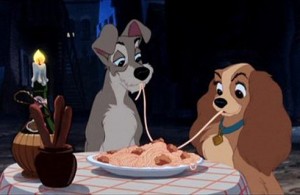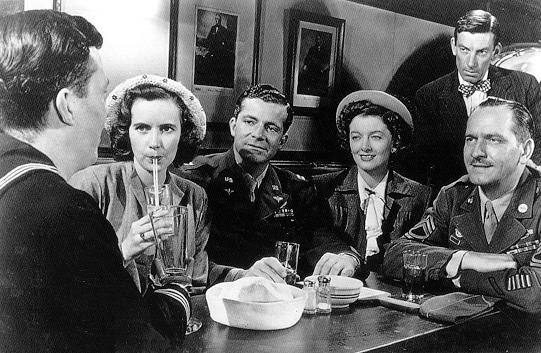Lady and the Tramp
Posted on December 13, 2002 at 5:17 am
A+| Lowest Recommended Age: | Kindergarten - 3rd Grade |
| MPAA Rating: | NR |
| Profanity: | None |
| Alcohol/ Drugs: | None |
| Violence/ Scariness: | Characters in peril |
| Diversity Issues: | A theme of the movie |
| Date Released to Theaters: | 1955 |
| Date Released to DVD: | February 6, 2012 |
| Amazon.com ASIN: | B0061QD82E |
 Perfectly timed for Valentine’s Day, Disney’s romantic animated classic “Lady and the Tramp” is out this week for the first time in a Diamond DBD/Blu-Ray combo.
Perfectly timed for Valentine’s Day, Disney’s romantic animated classic “Lady and the Tramp” is out this week for the first time in a Diamond DBD/Blu-Ray combo.
Lady is the pampered cocker spaniel of a couple she knows as “Jim Dear” and “Darling.” Her best friends are Jock (a Scottie) and Trusty (a basset hound who has no sense of smell). They ignore a stray named Tramp. When Darling has a baby, Lady is apprehensive, but Jim Dear and Darling assure her that she is still important to them. The couple has to go away, though, and Aunt Sarah arrives, with her nasty Siamese cats, to care for the baby. The cats make a mess of the living room and Lady gets the blame. Aunt Sarah puts Lady in a muzzle, and Lady, hurt and humiliated, runs away.
She meets Tramp, who finds a way to get the muzzle off with the help of an obliging beaver (Stan Freberg). Then Tramp takes Lady out on the town, ending with a romantic spaghetti dinner at Tony’s restaurant. The next morning, on her way home, she is captured by the dogcatcher. At the pound, she hears from Peg (Peggy Lee) that Tramp is a rogue with many lady friends, and she is disillusioned.
Aunt Sarah gets Lady and takes her home, banishing her to the doghouse. But with Tramp’s help Lady gets inside to save the baby from a rat. The crib is knocked over, and Aunt Sarah blames Tramp. She calls the dogcatcher to take him away. Just in time, Jim Dear and Darling return, and understand what has happened. With the help of Jock and Trusty, they get Tramp back. Trusty is hurt, but not badly, and he and Jock go to visit on Christmas to see Lady and Tramp and meet their new puppies.
This is one of Disney’s best animated films, with an appealing story and memorable music by Peggy Lee and Sonny Burke. Kids with new (or expected) siblings may like to talk about Lady’s concerns about the new baby. The way the story is told from the dogs’ perspective may be of interest to younger kids, who are just learning that not everyone sees the same things exactly the same way. And many kids will identify with Lady’s sense of frustration when the adored Siamese cats frame her for destroying the living room.
Parents should know that there are some tense moments and mild peril.
Family Discussion: Why does Lady think her owners’ names are “Jim Dear” and “Darling?” Why was Lady worried about what would happen when the baby came? How did Lady feel when Aunt Sarah blamed her for what the cats did? Why didn’t Lady like Tramp at first? What made her change her mind?
Activities: Make up a story about what might happen with the puppies after the movie ends. And have a spaghetti dinner!
If you like this, try: other Disney animated classics like “Pinocchio” and “101 Dalmatians”

